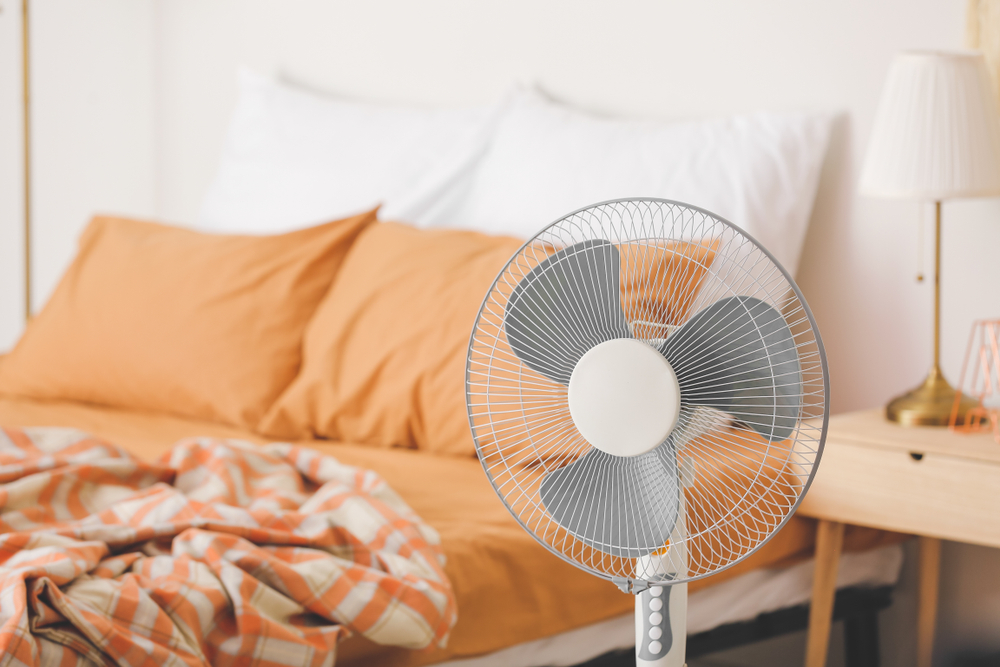Although the official start of summer is still a few weeks away, many of us are already in full summer mode, thanks to the longer days and glorious weather. The warmer months signal the return of backyard barbecues, fun-filled vacations and lots of activity outside. But for all its many pleasures, there’s no denying that summer can be tough on our sleep schedules. The extended daylight and uptick in social gatherings can disrupt our sleep routines, depriving us of much-needed sleep.
The key to getting back on track? Knowing what changes to look for in your sleep habits and tweaking your routine accordingly. Here are a few tips to help you establish a summer sleep routine that maximizes both the quality and quantity of your shut-eye.
Table of Contents
Invest in blackout shades or a high-quality sleep mask
One of the easiest things you can do to keep your sleep schedule on track this summer is to make sure your room is pitch-black at night. Humans are biologically programmed to sleep when the sky is dark. When the retinas in our eyes perceive darkness, it signals the pineal gland in the brain to produce the sleep hormone melatonin.
To achieve a pitch-black bedroom, invest in blackout curtains designed to block light and help you sleep. Alternatively, you can use a high-quality sleep mask to block out light. Sleep masks are particularly beneficial for summer travelers because they can block out light wherever you lay your head at night.
Start your day off with a morning walk
Extended daylight hours in the summer aren’t all bad news for our sleep. In fact, research shows that sun exposure can be a net positive for your shut-eye if you get the timing right.
Source: Morocko/Shutterstock.com
In a study published in Sleep Health, researchers analyzed the effect of morning light exposure on 109 female participants. Their results showed that participants exposed to greater amounts of early morning sunlight (between 8 a.m. and noon) fell asleep faster and had better quality sleep than those who received less morning sunlight.
A great way to get early morning sun exposure is to take a brisk walk first thing in the morning. Not only will you improve your sleep at night, but the fresh air and exercise will help wake you up and flood your brain with mood-boosting endorphins.
Stick to a relaxing bedtime routine
The summertime is more stressful than many people think. With increased social opportunities, work deadlines and summer vacations to plan, it’s easy to feel frazzled by the end of the day. If you don’t take the time to wind down before bed, your brain may still be racing by the time you slip under the sheets.
To prepare your mind and body for slumber, establish relaxing habits that help you sleep and do them in the same order every night so your brain starts to associate them with sleep.
Some ideas for relaxing bedtime activities include:
- Taking a warm bath in Epsom salt
- Wrapping yourself in a cozy weighted blanket and reading a book
- Writing in a journal
- Listening to music or a meditation podcast
Create a summer sleep sanctuary
When you’re finally relaxed enough to hit the hay, you need a space that feels refreshing and cool, particularly as the mercury begins to rise. Set the thermostat to a comfortable temperature (somewhere between 60 and 67 degrees Fahrenheit is the sweet spot, say experts).
Source: Pixel-Shot/Shutterstock.com
Don’t have a working AC? Fear not because there are plenty of other ways to keep your bedroom cool. Start by replacing your warm winter bedding with linens in lighter, natural fabrics. If you’re still waking up sweating, invest in a couple of high-quality fans and use them to create a wind tunnel effect.
Be consistent
After spending a long and dreary winter cooped up inside, there’s nothing better than making long-awaited plans and catching up with friends you haven’t seen in a while. When surrounded by good company, it’s tempting to stay up late to squeeze in more time with the people you love. However, it’s important to keep your sleep schedule consistent, especially in the summer.
Why? Well, for one thing, it helps to maintain the timing of your circadian clock — the internal timing system that tells you when to sleep and wake up, among other things. An optimized circadian clock will make it easier to fall asleep at night in the summer (and year-round, for that matter).
Moreover, if you stay up late, you’re more likely to sleep in the next day. Consequently, your eyes won’t perceive sunlight until much later in the morning, and your melatonin production will be delayed, making it that much harder to fall asleep at night.
Make moderate adjustments to your bedtime routine if necessary
Let’s face it — keeping the same bedtime routine year-round can be challenging. Many of us are driven to stay up later in the summer because of the longer days and increased social engagements.
If you’re having difficulty sticking to your normal sleep and wake times, consider pushing your bedtime back by 30 to 60 minutes. By shifting your bedtime later, you may have an easier time sticking to a consistent sleep schedule.
To ensure you’re getting enough sleep, remember to push your wake-up time back by the same amount. If you’re short on time in the morning, consider doing your grooming rituals the night before. That way, you have more time to sleep in the morning.
Final Thoughts
It can be difficult to sleep when you have vacations, outdoor activities and late-night social gatherings on the calendar. But the truth is, you still need high-quality sleep, even when the warmer months make it harder to hit the pillow. With these tips, you can establish a summer sleep schedule that works for you.








